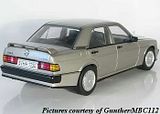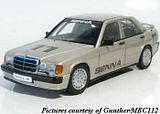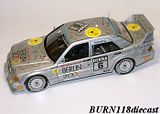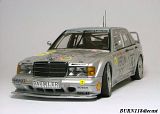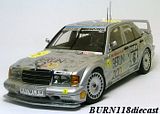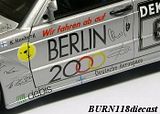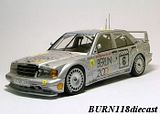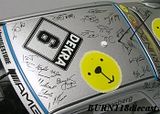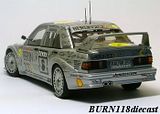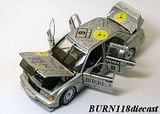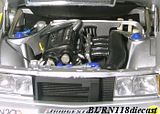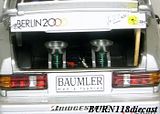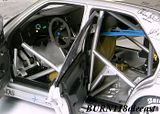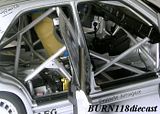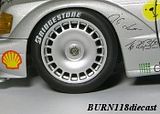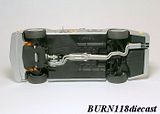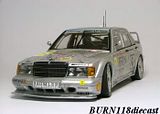 |
|
Home - Site Map - Lamborghini - Porsche - Street - Motorsport - Contact - Links |
|
Strikingly enough, Mercedes never had any intention in producing the 190E for the track. The 190E 2.3-16V was first built by Mercedes to enter the rally championship. But Audi were utterly dominating the scene with the Quattro, so Mercedes were led to dump the rally project. This was the start of the sedan we know nowadays. Mercedes partially rebuilt the car and recast it into a sports sedan. It introduced the car at the 1984 Frankfurt Motorshow and later used the car to sponsor a race between former and current (at that time) Formula one drivers at the Nurburgring. Senna with car #11 won the race. Mercedes never entered directly the racing scene with their
car, but sold the cars to privateers. Victories began to pile up and by 1989,
Mercedes partnered with AMG and took racing very seriously. This is when the
2.5 16V was born. The DTM rules changed, the new displacement limit now stood
at 2.5. Mercedes purposely built 502 Evos (2.5 16V) to qualify for DTM racing
rules. In that year, AMG won 7 races.
This version is the 190E 2.5-16V Evolution 2 known as �Berlin
2000� that raced in the 1992 DTM season with Keke Rosberg at the wheel.
Mercedes had a great year with 3 of their drivers in the first 3 places of
the overall standings, Klaus Ludwig being the championship winner. During
the year, Keke scored 5 podiums (one in 2nd, four in 3rd),
but other than that, the season was pretty poor with one 4th place,
one 11th place and another in 17th. The remaining four
were disappointing DNFs. However, it still landed him in 5th place
overall. AutoArt produces this car and it is a 1/18 diecast model, part of
their Millenium line. At first glance, the model looks mighty fine with
very intricate detailing and and a superb paint job. Luckily, as opposed
to some other silver cars from AutoArt, the silver paint job is uniform on all
parts of the car. One thing I think AutoArt got slightly wrong
though is the ride height. It certainly looks to be too high at the front when
compared to the real car.
The thing I absolutely like about this model is the livery. In 1989, Germany welcomed the fall of the "Wall of Berlin" and with it, the re-unification of East and West Germany. Germany, particularly the East part, was in need of restructuring and to boost this, Germany bid Berlin to host the 2000 Olympics. The bear face which is painted numerous times on the car is the symbol/mascot of Berlin. There are a total of 65 signatures on the car, all signed by famous poeple of the like of Niki Lauda and John Mc Enroe. As I have not found any information regarding the signatures, I assume that they are petition-like signatures showing support to Berlin's bid. To add to this thought, the number of signatures depicted on the car increased during the course of the season. However, the signature part still stays as an assumption made by myself.
Unfortunately, I couldn't find any pictures of the back of the car, however, it looks superbly detailed with yet again magnificent looking lights and delicate pins holding the rear compartment down. The silencers are very well made and realistic, however, they are only slightly excavated, it is hard to notice though.
The model has a lot of opening features, these being the front compartment, rear compartment and all four doors. Quite excellent I must say. All shut lines are very discrete and hinges are all very realistic. It would have been really great if the pins would actually work, but probably I would be asking way too much at this price point. All parts, except for the rear part, stay open by themselves.
The bonnet comes up, held by two very realistic hinges and does stay up on its own. The engine looks smaller than one would have thought it would be but it looks very realistic. Again, unfortunately I couldn't find an engine picture of this particular racing car, but after comparing it to the standard racing Evolution 2 engine issued from Mercedes, I can say that it looks very accurate in colours and detail. Wires are individualised and components are made from separate pieces and coloured accordingly.
The rear compartment is the only part with the usual AutoArt syndrome, the opening part does not stay open by itself. On the whole though the part looks well detailed and up to standard for a model of this caliber.
All four doors open, quite strange for a racing car but yet again, it's accurate. The cockpit is very well detailed and realistic. The dashboard has just one gauge like the real car, but on the whole, AA's effort on this part is a bit low compared to the rest of the cockpit. The racing seat, branded recaro, looks good and the seatblets are absolutely superb, individualised and realistic. The inside also houses a rollcage which is absolutely realistic and accurate.
The wheels and rim are of a very high level. The rim is perfectly accurate and coloured very well. The rubber is thin and branded "Bridgestone", accurate as one of the car's sponsor is the tyre brand Bridgestone. The rim style completely hides the brake and axle detail.
The undercarriage is quite good with a very high level of detaul and many separate pieces coloured in realistic colours. It shows much of the axle detail which was hidden by the rim style. The disk barke moves with the wheels and the caliper is static.
On the whole, this is an excellent looking model and very well made by AutoArt and I feel very lucky to own it. Its heavy and mostly metal, a true replica. To any motorsport fan, this is highly reccomended. Surely will remain one of my favourite cars. Its a mystery how can AA produce something of this level and at the the same produce other racing cars of very low level. |

